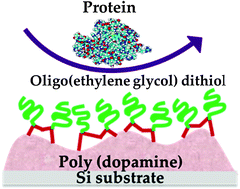Dithiol-based modification of poly(dopamine): enabling protein resistance via short-chain ethylene oxide oligomers†
Abstract
We present a facile strategy to modify poly(dopamine) (PDA)-coated substrates. Using thiol-terminated short chain ethylene oxide oligomers (OEG) under aqueous conditions, we explore the creation of a model surface exhibiting resistance to nonspecific protein absorption (RPA) by engineering the surface properties of a PDA adlayer. Surprisingly, dithiol-terminated OEG molecules demonstrated significantly greater coverage on PDA surfaces than analogous monothiol molecules. Successful RPA is only achieved with dithiol-terminated OEGs.


 Please wait while we load your content...
Please wait while we load your content...